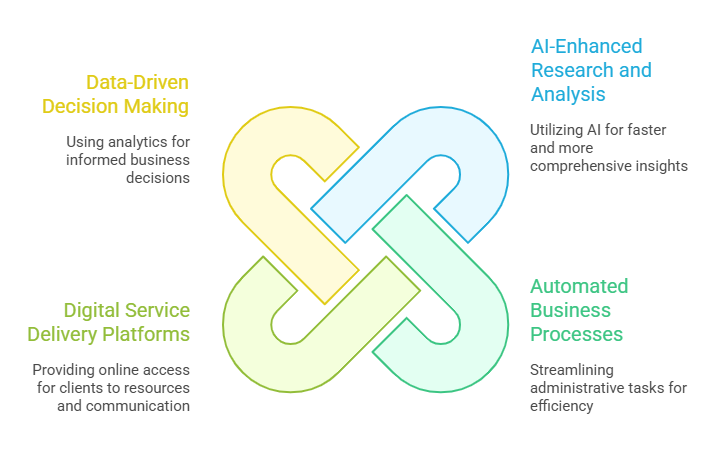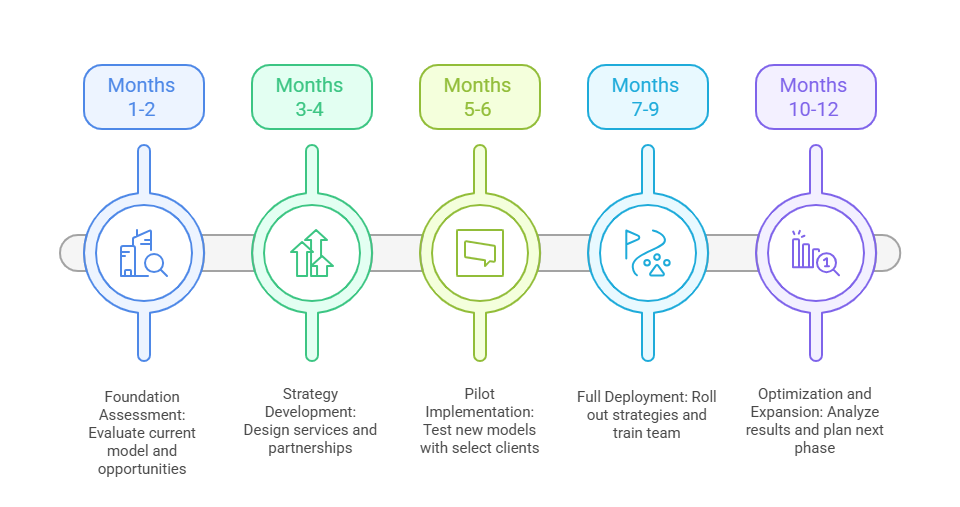The consulting industry continues evolving rapidly, presenting unique challenges and opportunities for business owners seeking sustainable growth. While many consulting firms struggle with the traditional time-for-money model, smart agency leaders are discovering innovative ways to scale their operations without proportionally increasing their workforce or overhead costs.
Understanding these 7 scalable opportunities for consulting and agency businesses can transform your approach to growth, helping you build predictable revenue streams while delivering exceptional value to clients. Let's explore the strategies that successful consulting firms are using to break free from the limitations of hourly billing and create truly scalable business models.
Common Questions About Scaling Consulting Businesses
Q: What's the biggest challenge when trying to scale a consulting business?
The primary challenge is typically moving away from the time-constrained service model where revenue directly correlates with hours worked. Many consulting businesses find themselves stuck in a cycle where growth requires hiring more people, which increases overhead costs and complexity without guaranteeing proportional revenue increases.
Q: How long does it usually take to see results from scaling strategies?
Most consulting businesses may begin seeing initial results within 3-6 months of implementing scalable strategies like productized services or automation tools. However, building sustainable retainer relationships and establishing strong niche positioning often requires 6-12 months of consistent effort and refinement.
Q: Can small consulting firms compete with larger agencies when implementing these strategies?
Small consulting firms often have significant advantages when implementing scalable strategies, including greater agility, more personalized service delivery, and the ability to pivot quickly based on market feedback. These factors can help smaller firms establish strong competitive positions in specific niches.
Strategic Service Models for Sustainable Growth
Transforming your service delivery model represents one of the most impactful approaches to scaling your consulting business. Rather than relying solely on traditional project-based work, successful agencies are adopting service models that create predictable revenue streams.
- Productized Consulting Services: Convert your expertise into standardized service packages that can be delivered consistently across multiple clients, reducing customization time while maintaining quality standards.
- Retainer-Based Relationships: Establish ongoing monthly retainers with clients who need continuous strategic support, creating predictable cash flow that helps with financial planning and resource allocation.
- Hybrid Service Delivery: Combine traditional consulting with productized elements, allowing you to maintain personalized service while incorporating scalable components that improve efficiency.
- Knowledge Transfer Programs: Develop structured programs that teach clients to implement solutions independently, creating additional revenue streams while building long-term relationships.
Technology Integration and Automation Benefits

Leveraging technology and automation can significantly enhance your consulting business's scalability by streamlining operations and improving service delivery efficiency. These technological solutions allow consulting firms to handle more clients without proportionally increasing their workforce.
- AI-Enhanced Research and Analysis: Implement artificial intelligence tools for market research and data analysis, enabling faster report generation and more comprehensive insights for clients while reducing manual research time.
- Automated Business Processes: Streamline repetitive administrative tasks such as client onboarding, project tracking, and invoice generation to free up valuable time for high-value consulting activities.
- Digital Service Delivery Platforms: Create online platforms where clients can access resources, track project progress, and communicate with your team, improving client experience while reducing administrative overhead.
- Data-Driven Decision Making: Use analytics tools to track client satisfaction, project profitability, and operational efficiency, enabling more informed business decisions and continuous improvement.
Building Strategic Partnerships and Networks
Developing strategic partnerships represents a powerful way to scale your consulting business by expanding your service capabilities and market reach without significant internal investment. These relationships can provide access to new clients, complementary expertise, and additional revenue opportunities.
- Subcontracting Relationships: Partner with specialized consultants who can handle specific aspects of larger projects, allowing you to take on more comprehensive engagements without hiring full-time staff.
- Referral Partner Networks: Establish relationships with complementary service providers who can refer clients to your business while you reciprocate, creating mutually beneficial growth opportunities.
- Industry Association Participation: Active involvement in professional associations can provide networking opportunities, credibility enhancement, and access to potential clients seeking specialized expertise.
- Strategic Alliances: Form alliances with companies that serve similar markets but offer different services, creating opportunities for joint proposals and expanded service offerings.
Essential Steps for Market Positioning
Effective market positioning through niche specialization can dramatically improve your consulting business's scalability by establishing you as the go-to expert in specific areas. This focused approach often leads to higher fees, better client retention, and more referrals.
- Identify Your Unique Expertise: Analyze your team's skills, experience, and passion areas to determine where you can provide exceptional value that competitors might struggle to match.
- Research Market Demand: Investigate potential niches to ensure sufficient market demand exists for your specialized services, including analyzing competitor positioning and client pain points.
- Develop Specialized Methodologies: Create proprietary frameworks and processes that demonstrate your expertise and differentiate your approach from generic consulting services.
- Build Thought Leadership: Establish yourself as an authority in your chosen niche through content creation, speaking engagements, and industry participation that attracts ideal clients.
- Refine Your Messaging: Craft clear, compelling communication that articulates your unique value proposition and resonates with your target audience's specific needs and challenges.
Implementation Timeline for Growth Strategies

Successfully scaling your consulting business requires a structured approach to implementing growth strategies. This timeline provides a framework for systematically building scalable operations while maintaining service quality and client satisfaction.
- Months 1-2: Foundation Assessment: Evaluate your current service delivery model, identify bottlenecks, and determine which scalable opportunities align best with your business goals and market position.
- Months 3-4: Strategy Development: Design your productized services, establish automation systems, and begin developing strategic partnerships that support your scaling objectives.
- Months 5-6: Pilot Implementation: Launch pilot programs with select clients to test your new service models, gather feedback, and refine your approach before broader implementation.
- Months 7-9: Full Deployment: Roll out your scaling strategies across your client base, train team members on new processes, and monitor performance metrics to ensure effectiveness.
- Months 10-12: Optimization and Expansion: Analyze results, optimize underperforming strategies, and begin planning for the next phase of growth based on lessons learned and market feedback.
These 7 scalable opportunities for consulting and agency businesses provide a roadmap for sustainable growth that goes beyond simply working more hours or hiring additional staff. By focusing on productized services, leveraging automation, building strategic partnerships, and establishing strong niche positioning, you can create a consulting business that scales efficiently while delivering exceptional value to clients.
The key to success lies in selecting the strategies that align with your unique strengths and market opportunities. Whether you're implementing retainer-based models, investing in automation technology, or developing subcontracting relationships, the goal remains the same: building predictable revenue streams that support long-term business growth.
Remember that scaling a consulting business is often a gradual process that requires patience, persistence, and continuous refinement. Start with one or two strategies that feel most natural to your current operations, then expand your approach as you gain experience and confidence in these new models.

.png)






